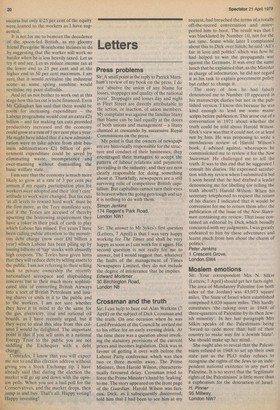Crossman and the truth
Sir: I can help to bear otit Alan Watkins (7 April) on the subject of Dick Crossman and the truth. On one occasion when he was Lord President of the Council he invited me to his office for an early evening drink. At the time there was a question about invoking the statutory provisions of the current prices and incomes legislation. Dick was in favour of getting it over with before the Labour Party conference which was then two or three months away. The Prime Minister, then Harold Wilson, characteristically favoured delay. Crossman tried to force the Prime Minister's hand by 'leaking' to me. The story appeared on the front page of the Guardian. Harold Wilson was furious. Dick, as I subsequently discovered, told him that I had been to see him at my request, had breached the terms of a totally off-the-record conversation and misreported him to boot. The result was that I was blacklisted by Number 10, not for the last time. Some while later I complained about this to Dick over lunch; he said `All's fair in love and politics' which was how he had helped to win the propaganda war against the Germans. It was over the same lunch that he explained that, as the Minister in charge of information, he did not regard it as his task to explain government policy but rather to change it.
The story of how he had falsely denounced me to Number 10 appeared in his manuscript diaries but not in the published version. I know this because he was kind enough to lend me some manuscripts before publication. This arose out of a conversation in 1971 about whether the truth could be told about Harold Wilson. Dick's view was that it could not, or at least not by him. He was proposing to write a mendacious review of Harold Wilson's book. I advised against, whereupon he commissioned me to review it for the New Statesman. He challenged me to tell the truth. It was to this end that he suggested I consult his diaries. He expressed satisfaction with my review when I submitted it but I soon heard that he had drafted a leader denouncing me for libelling (or telling the truth about?) Harold Wilson. When his secretary telephoned to request the return of his diaries I indicated that it would be convenient for me to return them after the publication of the issue of the New Statesmen containing my review. That issue contained an editorial by Dick which broadly concurred with my judgments. I was greatly endeared to him by these adventures and learnt much from him about the charm of politics.
Peter Jenkins 1 Crescent Grove, London SW4






































 Previous page
Previous page